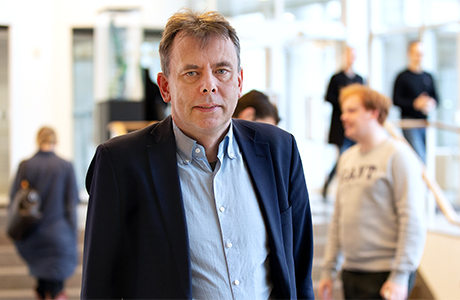- Home
- News and events
- Find news
- "HRM is a broad and exciting subject"

Photo: Erika Holm, School of Business, Economics and Law
Stefan Tengblad has returned to the School of Business, Economics and Law, after a decade away in Borås and Skövde. In autumn 2019, he took up a new professorship in human resource management – HRM, the first and only of its kind in Sweden.
The term HRM is often confused with HR, but while the latter may be part of HRM, there is more to it than that.
“HR is naturally an important component, covering the actual HR function and the people who work on it. But HRM is the overarching subject area and the theory behind it, with a wider remit that includes leadership and people-related work more generally,” says Stefan Tengblad.
HR issues are often strategic
He describes it as a broad and exciting subject. Companies are increasingly appreciating the strategic significance of HR issues and focusing in on them in a targeted way, for example through employer branding, organisational development and culture change. There is also a growing interest in reducing top-down management and creating organisations where employees work more independently, perhaps in agile teams that manage themselves and make their own decisions on their way to achieving the set goals.
HRM research at the School of Business, Economics and Law will now be more clearly concentrated within the Centre for Global Human Resource Management (CGHRM). The centre was established in 2012 as a collaborative venture involving academia, the business world and the public sector. The Department of Business Administration and the Department of Sociology and Work Science are behind the centre, along with 13 partner organisations.
“The idea moving forward is to gather researchers together, so they feel like they are part of a single unit. CGHRM has so far served mostly as a meeting place and an organiser of popular seminars. Now, however, we have the funding to adopt a more long-term approach, which will generate more goal-oriented research,” says Stefan Tengblad.
Two focus areas
He sees two areas that he wants to focus on in the future.
“The first is the personnel strategies of employers. What ideas are there about how work should be organized, which one to recruit, and how are these ideas translated into activities? This is what I plan to dedicate my research to,” says Stefan Tengblad.
The second area is a major drive to research what goes on within companies and organisations in the area of HR work. For this, Stefan Tengblad wants to build up a research team with its own doctoral students.
“What tasks are assigned to HR, and how are these changing? What effect are new concepts such as agility having? How are areas such as change, innovation and building sustainable workplaces being tackled?”
The idea is to create doctoral positions to study this area, and to enter into collaborations with other researchers.
“I want to build up an environment of maybe 30–40 researchers linked to CGHRM, who can study HRM from different perspectives, including the employee’s perspective and that of trade union organisations.”
Extensive experience
Stefan Tengblad feels comfortable in his new job – after all, he has been leading research for more than 15 years. After graduating, he studied for a PhD, which he obtained in 1997 with a thesis on the sourcing of managers. In 2008, he was made a professor at the University of Borås, but he switched to Skövde the following year.
“There I researched organisational resilience, by which I mean what makes organisations remain at the top of their game. It is very much about the interplay between economics, technology and social aspects, all of which need to be developed in parallel.”
In addition, he has written books and lectured widely on employment, and how the concept can be developed.
“There have also been books on a variety of other topics. In the book ‘Vinnande ledarskap’, which was published last year, I follow eight elite clubs in various sports to find common factors that may have led to their success. I came to this subject via different research, and it offers plenty of inspiration on everything from how to build a cohesive team to working on continuous improvement and creating an open and inviting organisational culture,” concludes Stefan Tengblad.